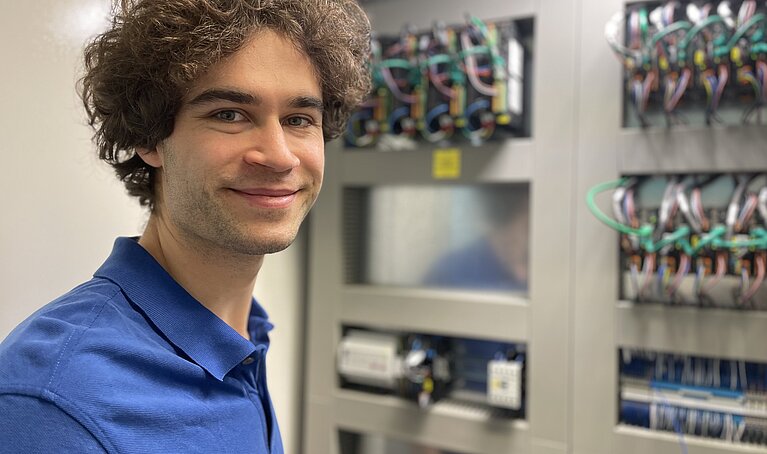Nick, your career at Eppendorf began in 2016 with an apprenticeship as an industrial mechanic specializing in precision engineering. What attracted you to it?
Basically, my passion for mechanics is responsible for this. I believe that you can only succeed at your job when you are enthusiastic about what you do. For example, I completely restored my '78 motorcycle myself, designed a wind generator using 3D printed wind wheels and built a CNC table with stepper motors and aluminum profiles. I enjoy it. That was also important to me for my professional life. Originally, after leaving school, I had fancied the idea of training as a mechatronics engineer, because that's where mechanics and electronics meet. That was exciting at first. But when I was in the application process, I realized relatively quickly that I wanted a clear technical focus. So, in the end, I made a very conscious decision to train as an industrial mechanic at Eppendorf.
What happened next for you?
After completing my apprenticeship at LH in 2020, I quickly realised that this would not be my "final career stop". I definitely wanted to continue my education. Given that I have always been very enthusiastic about mechatronics and electrical engineering, I was hoping to be able to work in this field at Eppendorf in the future. Unfortunately, however, there were no open vacancies, as wiring work etc. was usually carried out by external companies. Fortunately, LH recognised my enthusiasm and my potential and created a suitable position for me to enable me to work in the field of electrical engineering.
Together with the head of the Industrial Engineering & Software Development department (by the way, we just call it Equipment Engineering), we quickly agreed that I would be given the opportunity to start in this newly created position. Last year, I completed my technician training to become a state-certified electrical engineering technician specializing in energy technology and process automation. In order to expand my specialist knowledge, I am aiming to take on the role as electrical specialist responsible for control technology in equipment construction in the future, once I have received the necessary training. In this context, I can very well imagine, for example, becoming the responsible electrical specialist (in Germany it is called: VEFK (Verantwortliche Elektrofachkraft)) for all equipment manufactured in my area in due course.
What are your current tasks in control technology?
To be able to manufacture our laboratory products, such as our pipettes, and their further developments, we naturally need suitable systems and production lines as well as testing and adjustment stations. Our design engineers – four colleagues in our team – receive a project in the form of a specification sheet (list of requirements). If electronic components are required or production needs auxiliary equipment, for example when introducing new production steps, our control technology team is integrated into the project. We bring the designed machines to life, so to speak, carry out test set-ups and ultimately ensure that the unique machines are electronically functional and can be put into operation. Of course, in addition to the projects, this also includes routines, such as repairing failed sensors or components as part of maintenance, experimenting with given components or research.
What makes your job so special?
Basically, no two projects are alike because the requirements for each machine are always very individual. Whether it's camera-based counters in pipettes, motor control with a PLC (programmable logic controller) or comprehensive electrical and software development for robot-supported machines – I can always develop new solutions. It is a prerequisite for me to be able to continue my training in the areas of electrical planning, software programming and database connection, because the problems usually arise from these. I simply enjoy working in a solution-oriented way, experimenting in a practical way, and thus making my contribution to ensuring that automation technology continues to develop, becomes more and more innovative and always remains reliable for our production in the long term. This is simply good for my intrinsic "inventive spirit".
I also had and continue to have the good fortune of being surrounded by a team of real experts in their field, which has enriched my development immensely. My "buddy" in particular has accompanied me throughout my development with his sometimes critical, but at the same time technically knowledgeable comments, so that I didn’t have to start from scratch when finding solutions.
How has your path to control technology influenced your professional development?
Quite significantly, of course. In addition to my mechanical focus as a trained industrial mechanic, my start in control technology gave me the opportunity to continue my training in the field of electrical engineering. I also learn every day from the enormous amount of specialist knowledge within the department. You also keep learning from the freedom to tackle different challenges. Starting out in control technology at Eppendorf has given me a completely new career perspective with new areas of focus thanks to the mix of electronics and software development.
If you had to name three things that are important to you at your employer, what would they be?
Flextime without core working hours, the option to reduce hours and permanent employment. That would be my short answer, but I would like to add another aspect that is important to me: everyone at Eppendorf can be proud to work for a company where you can stand behind the products. They help humanity and do no harm to anyone. We are all working for a good cause – this unites not only the colleagues in Hamburg, Germany, but the entire Eppendorf community worldwide.

